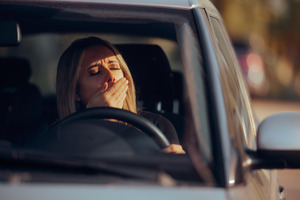Have Sleep Apnea? Beware of Drowsy Driving
February 13, 2025

Are you currently struggling with sleep apnea? If so, you can’t afford to ignore it. Not only can the disorder have serious consequences for your health, but it can also leave you feeling excessively sleepy – and that can be very dangerous when you’re behind the wheel. Below is a closer look at how sleep apnea can affect your ability to drive safely, as well as what you can do to have the issue treated.
What Happens When You Have Sleep Apnea?
Sleep apnea is an all-too-common sleep disorder that is estimated to affect roughly 30 million people in the United States. It causes your breathing to repeatedly stop and restart while you’re asleep. Each pause in breathing forces your brain to wake your body up for air. Even though these awakenings are so brief that you might not even remember them, they are still enough to pull you out of the sleep cycle and prevent you from getting a sufficient amount of quality slumber, thus leaving you feeling drowsy during the day.
Why is Drowsy Driving Dangerous?
If sleep apnea has left you feeling more tired than normal, you may end up dozing off while driving. It may only be for a few seconds, but that’s more than enough time for an accident to occur. Furthermore, drowsiness can make it harder to pay attention to your surroundings and slow down your reaction time, which can easily lead to dangerous situations while on the road. And since your ability to make good decisions is often impaired while you’re tired, you may end up taking unnecessary risks.
What Can You Do About Sleep Apnea and Drowsy Driving?
You definitely don’t want to make drowsy driving a habit, so you should prioritize having your sleep apnea treated as promptly as possible. The first step is to have it properly diagnosed, which requires undergoing a sleep study.
Once it has been confirmed that you are suffering from sleep-disordered breathing, you can start exploring potential solutions. Sleep apnea is often caused by obstructions of the airway. Thus, it’s traditionally treated with a CPAP machine that keeps the airway open with a steady stream of pressurized air. However, if you’re CPAP intolerant, you may benefit from wearing an oral appliance instead. This simple device can reposition your lower jaw to make airway obstructions less likely to occur.
Even if you’re having your sleep apnea treated, you should still be wary of drowsy driving. If you start to feel sleepy or catch yourself dozing off while on the road, take the opportunity to rest as soon as you can. It’s better to err on the side of caution than it is to put yourself at unnecessary risk.
The potential consequences of drowsy driving are too grave to ignore. Take whatever steps are needed to get your sleep apnea under control as soon as possible so that it doesn’t affect your performance while you’re in the driver’s seat.
About the Author
Dr. Ivan Paskalev has practiced dentistry in Bulgaria, the United Kingdom, and the United States. He is pursuing the American Academy of Dental Sleep Medicine’s Mastery Program. At his practice, Better Sleep Eugene, he provides different types of oral appliances to help his patients overcome their sleep apnea. To schedule a consultation with Dr. Paskalev, visit his website or call (541) 246-8284.

